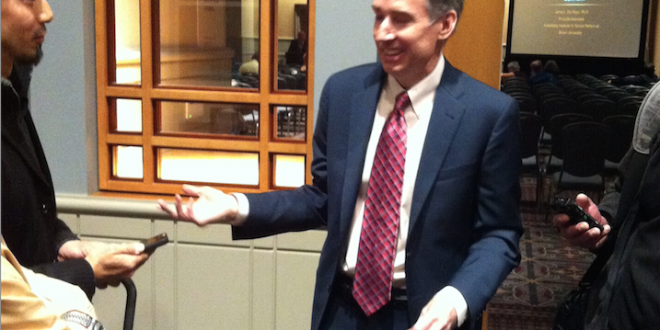Pennsylvania's Opportunity Scholarship Tax Credit and the Seperation of Church and State
This is an except from an article on this blog originally published on April, 19th, 2014: Talking Back to Mark Gleason
The article is about a discussion with Mark Gleason, executive director of the Philadelphia School Partnership, about the PSP's plans for the privatization of Philadelphia public schools. This was a press briefing during the meeting of the American Educational Research Associaton held in Philadelphia April 3rd - 7th.
This excerpt is about the violation of the Pennsylvania constitution by the PSP's promotion of using public school funds for student scholarships to private and parochical schools.

Continuing with the conversation with Gleason, he said,
In Philadelphia many of the religious schools are serving low income kids. They are doing it very efficiently. Yes, the families have to pay tuition, but there is scholarship money available. Many of the families are paying only one hundred dollars a month tuition. They are making that sacrifice because they feel they are getting a better quality education. Our research would show that there are many high performing Catholic schools. There are some not so good Catholic schools as well. We try not to fund in those. But there are a lot of good Catholic schools. When we look at school investments what we are doing is looking neighborhood by neighborhood, what are the good family options there. In some neighborhoods the Catholic school is the best option, in other neighborhoods the District school is the best option. We wouldn’t invest in a Catholic school in a neighborhood that had a good District school option. That’s not a portfolio approach.
Article III, Section 15 of the Pennsylvania State Constitution says :
No money raised for the support of the public schools of the Commonwealth shall be appropriated to or used for the support of any sectarian school.
The separation of church and state has been a tradition of American society for over 200 years. It is a tradition that is the envy of the world because religious organizations do not interfere with the state because the state represents all, and the state does not interfere with religion. In Mr. Gleason’s statement we can see the danger that corporate education reform represents for this tradition. One of the democratic values that public schools represent is respect for all students regardless of religious belief. Not only is PSP promoting a system which would lead to sectarian divisions that American society had been moving away from, but it promotes the interference of corporate “philanthropy” as the arbiter of which, in this instance, Catholic schools should be dropped as “losers”. The corporate portfolio method of education reorganization ignores the religious mission of Catholic schools which does a disservice to children whose families do not share the particular belief of the school and does a disservice to Catholic schools because it negates their religious mission for market considerations.
A reporter questioned Gleason that given the scarcity of resources available for the School District does he think it is OK to give money to tuition based religious schools. Gleason responded:
Just to be clear, I’m giving private philanthropic dollars to those schools…The Great Schools Fund’s goal is to make sure there is a good school for every student in the city. If I can increase the number of good schools by giving money to Catholic schools, absolutely I want to do that.
This is the essential sleight of hand being played by the supporters of corporate education reform to get around the Pennsylvania Constitution’s prohibition of state funding of sectarian schools. The PSP program depends on business tax breaks to fund those schools. Voters have repeatedly rejected attempts to introduce vouchers for private and religious schools in Pennsylvania. The Corbett administration has gotten around this democratic choice by passing legislation for an Educational Improvement Tax Credit (EITC) which gives businesses a state tax credit of 75% (90% after two years) of their contribution up to $300,000 towards scholarships for students to go to private and parochial schools. Even though this has been in effect since 2001, it was largely ignored until the Corbett administration engineered a bill to increase its profile. So businesses are now not paying taxes to the state but are giving money to parochial and private schools. The end result is the funding of sectarian schools by the businesses is reducing the money available for public school funding, precisely what the state Constitution prohibits..
This method of circumventing the Pennsylvania Constitutional mandate against government funding sectarian schools was pioneered by then Florida Governor Jeb Bush after vouchers were declared unconstitutional by the Florida Supreme Court in 2006. Funding for Florida's Corporate Income Tax Credit Scholarships program has risen dramatically since its inception.